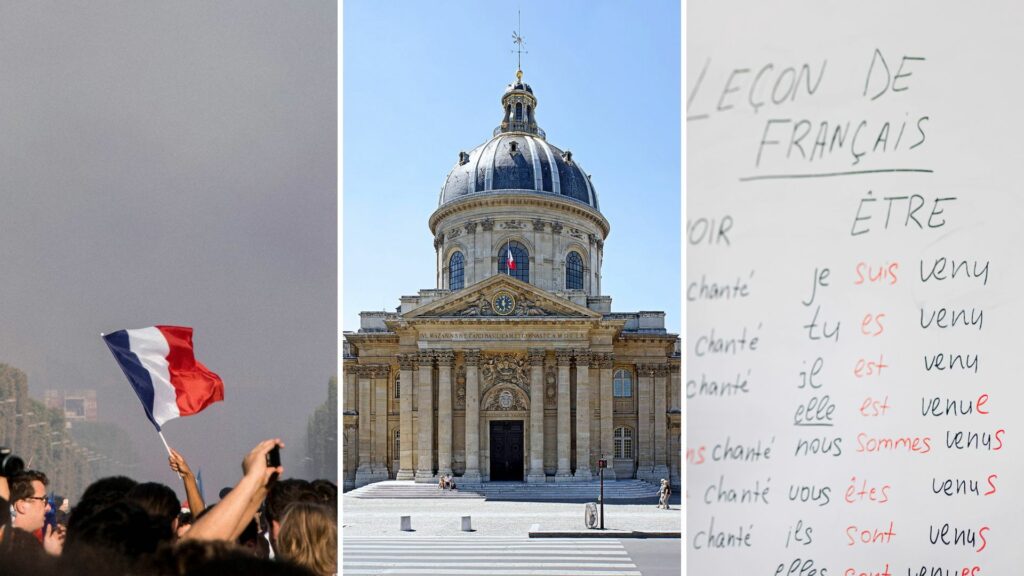French senators will debate a controversial bill aimed at "protecting the French language from excessive so-called 'inclusive writing'" on Monday evening, with left-wing parties deeming the move "old-fashioned", Belga News Agency reports.
With French President Emmanuel Macron inaugurating the Cité internationale de la langue française – a cultural and living place entirely dedicated to the French language – in the restored Villers-Cotterêts château just outside Paris on Monday, the timing of the Senate's proceedings seems apt and promises some heated debates in the Chamber from 21:30 onwards.
The text by right-wing The Republicans (LR) senator Pascale Gruny proposes a ban on inclusive writing "in all cases where the legislator (and possibly the regulatory authority) requires a document in French."
This includes a wide range of documents from instruction manuals and employment contracts to company internal regulations and legal documents – all of which would then be considered inadmissible or null and void if the measure were to be applied.
What are the proposed changes?
French is a heavily gendered language. Inclusive writing therefore seeks to ensure linguistic gender equality through using dots or dashes, to prevent the masculine from taking precedence and highlight the existence of a feminine form (for example, les étudiant·e·s sont intelligent·e·s, which refers to both female and male students). It also extends to neologisms such as iel (a combination of the masculine il and feminine elle) or celleux (a contraction of celles and ceux).
This form of writing has long been a point of contention in France, with French writer Marc Lambron even calling it "an internal attack on the language" in a radio interview in 2021. Indeed, the Académie Française (the principal French council for matters pertaining to the French language) referred to inclusive writing as an "aberration" in 2017.
Senators are now calling for a ban on these inclusive neologisms, such as iel and celleux. The proposed law also includes a ban on inclusive writing in the Education Code, although it was already banned in schools by a circular issued by former Education Minister Jean-Michel Blanquer in 2021, as he deemed it would make the language too hard to learn.
Exclusive inclusivity?
Moreover, some argue that this form of writing in fact does the opposite of what it sets out to achieve. "This is a practice that is precisely contrary to inclusion," LR senator Cédric Vial argued to AFP. "The people most affected by its use are people with disabilities, illiteracy or dyslexia. It is an additional constraint. To be inclusive, we need to simplify the language."
The bill continues to provoke indignation from some progressive senators, however. "It is unconstitutional, old-fashioned and reactionary, and part of a long-standing conservative trend against the visibility of women," declared Socialist Party (PS) senator Yan Chantrel.
He pointed out that, as it stands, the text would render null and void all identity documents issued in the old format, which include the words "né(e) le" ("born on") for the date of birth.
The bill stands a good chance of being adopted, given the dominance of the right and centre in the upper house. However, there is no guarantee that it will be taken up again by the Assembly: a similar proposal from the far-right National Rally (RN) was withdrawn during consideration in October when it was heading for rejection.
Indeed, President Macron also appeared to back the bill as he inaugurated the Cité internationale de la langue française on Monday, stating that France should "not give in to fashionable trends" and allow the language to live but also stay rooted in its foundations.
"In this language, the neutral form is provided by the masculine. We do not need to add dots in the middle of words to make it better understood," he added.
Related News
- French language spelling reform urged by linguists
- Interpreting or translating? How to get a job in the EU as a language lover
- Where to learn French and Dutch as an adult in Belgium
The ban on inclusive writing currently exists in a 2017 circular issued by former Prime Minister Édouard Philippe. This circular invited ministers to not use inclusive writing, particularly in texts published in the Official Journal of the French Republic.
Several members of parliament have already made proposals along these lines, particularly within the majority. A bill was tabled in 2021 banning the use of inclusive writing by people in charge of a public service mission, but it never made it onto the agenda.

